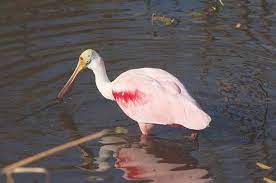The Roseate Spoonbill, scientifically known as Platalea ajaja, is a captivating wading bird that graces the wetlands and coastal areas of the Americas with its vibrant appearance and unique behaviors. With its distinctive pink plumage and spoon-shaped bill, this bird has captured the fascination of birdwatchers and nature enthusiasts alike. Join us as we delve into 15 intriguing facts about the Roseate Spoonbill, shedding light on its remarkable characteristics and its role within its watery habitats.

1. Pink Elegance: The Roseate Spoonbill’s striking pink plumage is a result of its diet, rich in carotenoid pigments.
2. Unique Bill: Its spoon-shaped bill is perfectly adapted for filtering small aquatic creatures from shallow water.
3. Wetland Dwellers: These birds are commonly found in coastal lagoons, estuaries, and mangrove swamps.
4. Group Dynamics: Roseate Spoonbills often gather in large flocks, creating captivating displays of synchronized flight.
5. Foraging Techniques: They sweep their bills side to side in the water to detect prey by touch.
6. Social Nests: Spoonbills often nest in colonies with other wading birds, fostering a sense of community.
7. Parental Duties: Both parents share the responsibility of incubating eggs and feeding chicks.
8. Peculiar Courtship Displays: Males perform unique rituals to attract females, involving bill clattering and head bobbing.
9. Habitat Diversity: They inhabit a variety of wetland habitats, contributing to ecosystem health.
10. Range Expansion: The Roseate Spoonbill’s range has extended northward in recent years, reflecting changes in habitat availability.
11. Cultural Significance: In some cultures, these birds are revered as symbols of grace and beauty.
12. Conservation Concerns: Habitat loss and disturbance pose threats to these sensitive wetland dwellers.
13. Global Distribution: Roseate Spoonbills can be found from the southeastern United States to South America.
14. Nesting Adaptations: Their nests are constructed from sticks and often located in trees or shrubs.
15. Ecotourism Draw: Observing the vibrant elegance of the Roseate Spoonbill in its natural habitat is a popular ecotourism activity.
Conclusion
The Roseate Spoonbill, with its unique bill and vibrant plumage, offers a captivating glimpse into the world of wetland biodiversity. As we explore these 15 intriguing insights, we gain a deeper appreciation for the role these birds play in maintaining the delicate balance of their watery habitats.



















Add Comment